Young Sheldon Stars, EP on Delicate Line Finale Had to Walk With George’s Funeral: ‘You Can’t Treat This Glibly’
We are gathered here this evening to mourn the loss of George Marshall Cooper, Sr. The Young Sheldon patriarch met his maker in the Big Bang Theory prequel’s antepenultimate episode, which set the stage for Part 1 of Thursday’s series finale.
Portrayer Lance Barber appeared throughout Episode 13 — first in an alternate reality sequence where Sheldon (played by “mighty little man” Iain Armitage) imagines getting one last moment with Dad before he leaves and never returns.
More from TVLine
“[Lance] was very instrumental in keeping everybody’s morale up, and seeing him towards the end start to get a little affected by it hit me harder than I thought it would,” Armitage shares with TVLine. “He’s always the funny one in between scenes, making jokes, making us look unprofessional because everyone’s laughing [when] they yell ‘action’ and we’re still snorting with laughter. [While filming those alternate realities] we kind of just looked at each other a few times and I’d go, ‘Thank you,’ and that… that struck me.”
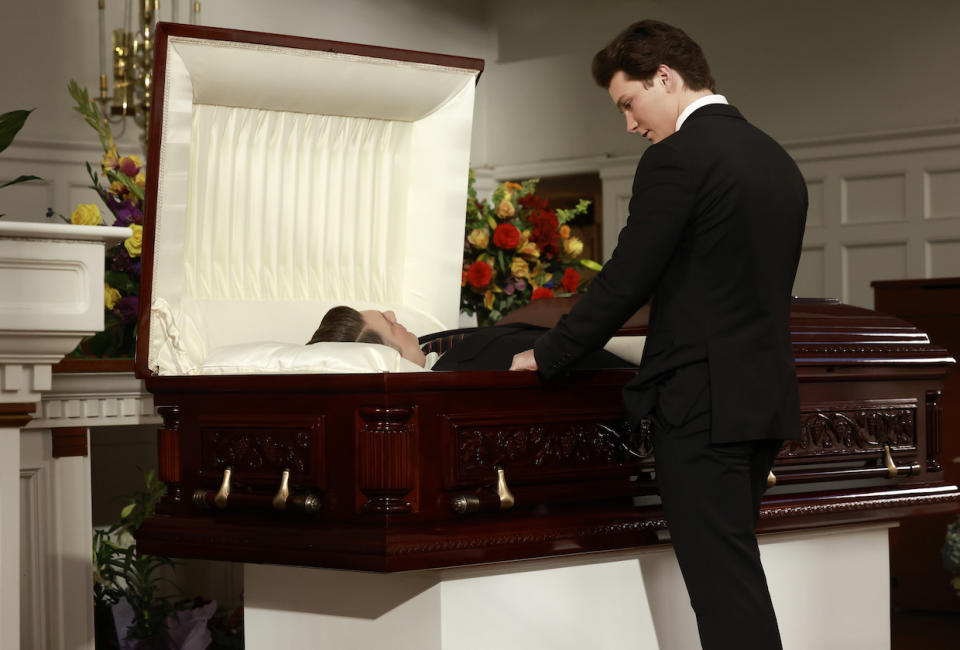
Barber also appears at George’s funeral, which features an open casket. Throughout the somber affair, each family member goes up, one by one, and says a final goodbye. Raegan Revord, who plays Missy, went first. “Those tears are real tears,” she says. “I go up first, I walk back, and I’m still sobbing behind camera. I have to sit there and watch Montana [Jordan, who plays Georgie] and Zoe [Perry, who plays Mary] go up and say their goodbyes, and that was the most brutal for me.
“We had tentatively finished the scene, but I was sobbing even more [now],” she recalls. “I turned to our director [Michael Judd] and said, ‘I need one more. Give me one more.’ I went back up and I did it two more times. They told me they used one of those takes instead.”
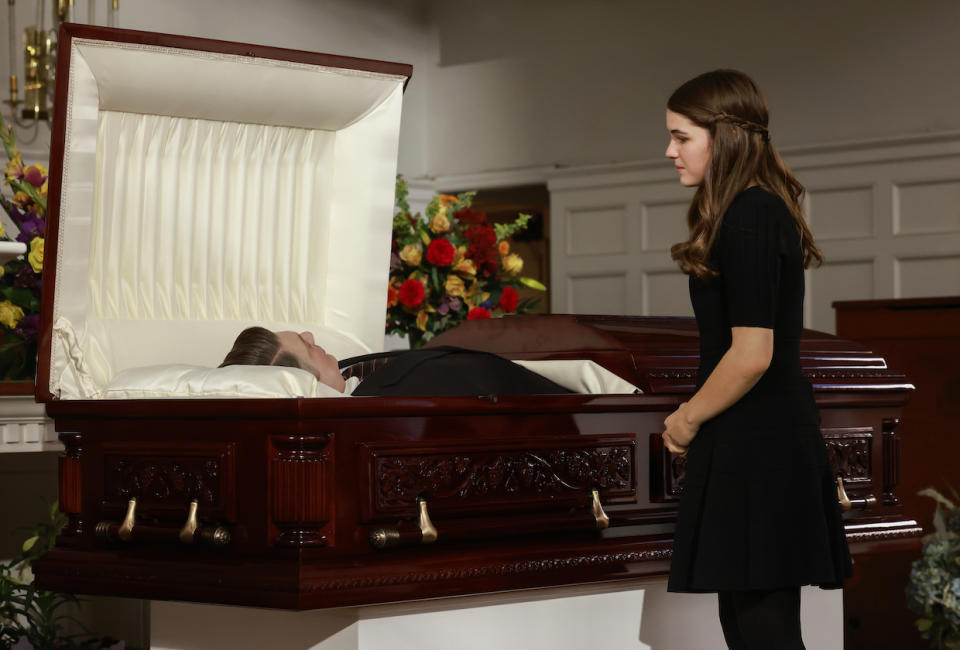
Sheldon, who’s still presenting as stoic, decides that he doesn’t want to say goodbye before they close George’s casket. But a few minutes later, he gets up and delivers a eulogy. Or so it seems.
“I wish I could tell you that I said all those things, but I didn’t,” our narrator reveals, confirming that what we’ve just seen is a figment of Sheldon’s imagination.
“For a long time, I focused on my father’s shortcomings,” Jim Parsons’ alter ego acknowledges. “Now that I am his age and have kids of my own, I realize that he was just a person doing the best he could. And he did a lot. I didn’t say it as his funeral, but I can say it now: I loved my father. I will miss him forever.”
The way Armitage sees it, knowing that Sheldon regrets not speaking that day makes up for his decision. “I think it adds more layers to it than if it were something that Sheldon got up and said,” he opines, “which almost makes it more beautiful.”
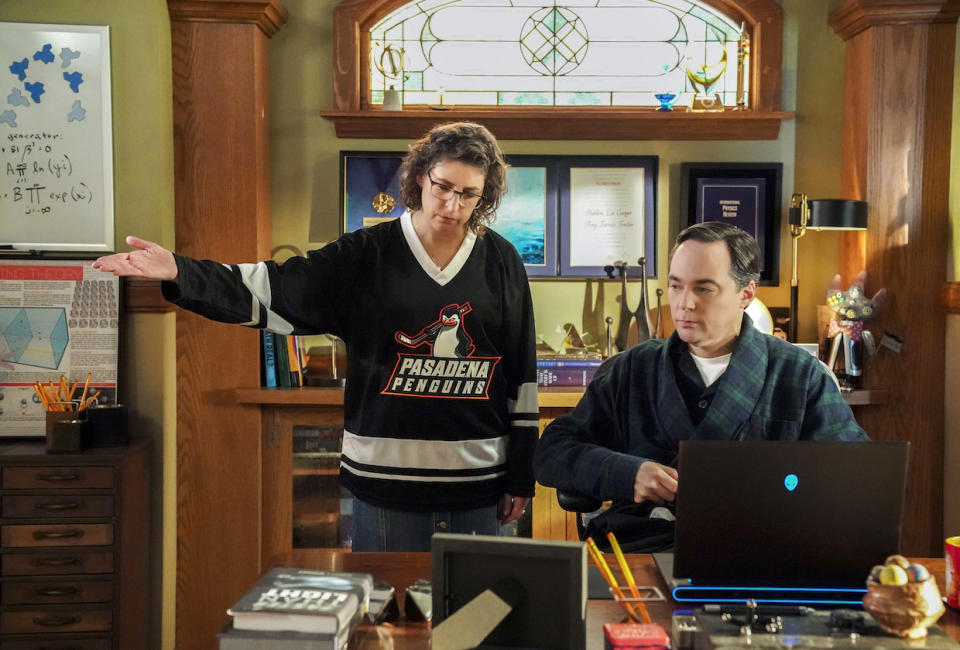
Young Sheldon Finale: What We Learn About Life After The Big Bang Theory
Below, Young Sheldon co-showrunner Steve Holland, who penned the episode with co-creators Chuck Lorre and Steven Molaro, tells us about crafting George’s memorial.
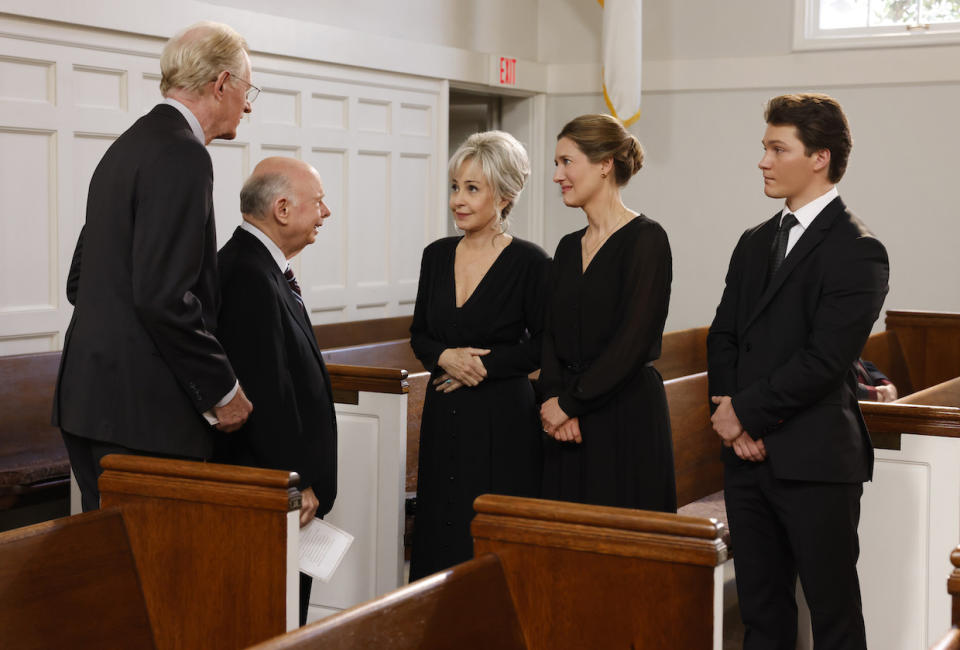
TVLINE | Was there any apprehension about setting Episode 13 almost entirely at George’s funeral, featuring an open casket, having everyone in tears, not constantly mining the subject matter for laughs…?
The endings of shows [are] always tricky, and you’re always aware that there’s a lot of audience expectation. At some point, you literally have to just put that aside and tell the story that you think is best and hope that people will follow you down that path. Otherwise, you can get lost in the spiral of “Are people going to like this? Are they going to hate this?” It felt important to us, for the family, and for the character [of George Sr.] to do it. You can’t treat this glibly. For us, living with these characters for all this time, they felt real; this family felt real.
Going into Episode 13, we were trying to find that balance where we recognize that it’s a comedy, and we were trying to have some moments of levity. We also wanted to make sure that we gave this moment its actual, proper weight. I think what we found was that there were some jokes and some lighter moments that were shot that, going into the edit, started to feel a little tone deaf. It felt like, “This family is grieving, and maybe we don’t need make a silly joke at this moment.” For the audience, too, they’ve lived with this family for so long that they can be in the shoes of our characters and also grieve George’s death. It’s emotional, and we felt like we had earned it. We also felt like that was being respectful to these characters to let them have this moment of grief.
It was difficult to write, it was incredibly difficult to shoot, and then we had to watch it over and over again in editing, and it gets me every time. Any time you cut to Raegan in tears, it gets me. It’s a weird mixture because the cast was also grieving the end of this show. It was really an emotional time. It took us two days, or a little more than two days in the church to film the funeral scenes — two days that were full of tears, people just weeping on camera and off camera, with some moments of levity. Lance wanted to be in the casket; he wanted to appear at his own funeral, so he’s actually in the casket, and he had a fart machine to lighten the mood when it needed lightening. But it was a rough couple of days.
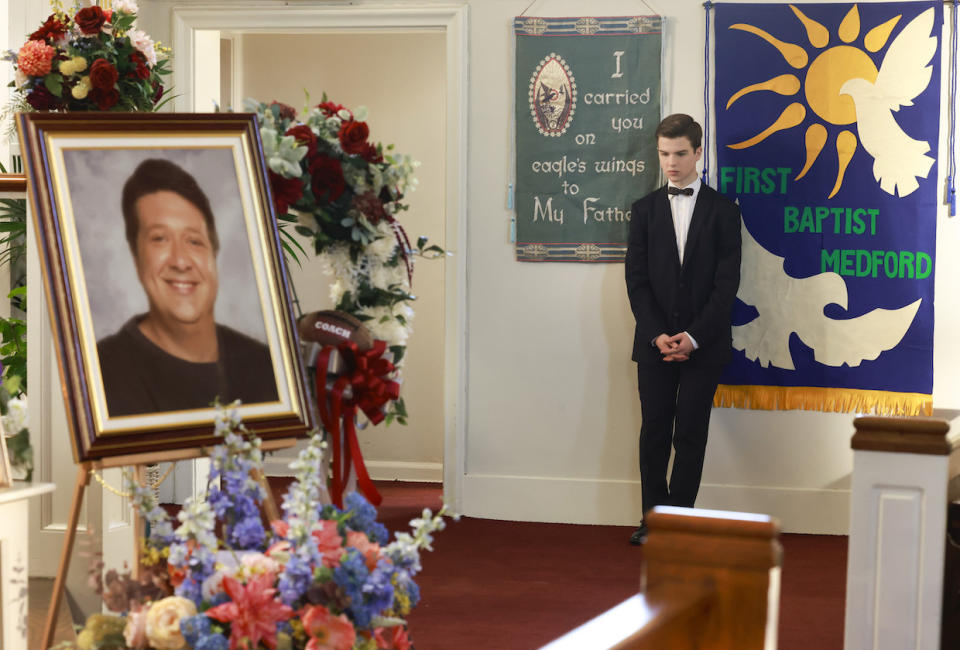
TVLINE | Can you talk to me about the idea behind Sheldon playing all those scenarios — all those different ways he could have had one last moment with Dad — in his head? Was it a way to show that, in his own unique way, Sheldon was, in fact, emotionally intelligent?
I think that’s exactly right. It kind of goes back to Episode 12. We spent a lot of time crafting George’s last moment — a lot of time for a scene where nothing happens — and it was very important to us that this just be an everyday moment. George is leaving for work, no one’s paying attention, that felt very real. Sheldon doesn’t even look up, he doesn’t say goodbye to him, and I think [the question] was, “How does Sheldon process grief?” It’s not that he doesn’t have emotions, he just doesn’t process them outwardly the way other people do, so for him it was running these scenarios. It was branching into timelines and what he could have said.
Running that back to the outside world, and especially to his sister, looks like he’s not affected at all by it. He just seems very stoic, in a way that is upsetting to her. But for him, this is how he is processing his grief; he’s trying to go back and rewrite those last moments with his dad in his brain. I don’t think he’s really even aware that that is what he is doing. As an adult, I think he is, but as a kid I don’t think he’s necessarily aware that he is processing grief. He’s trying to come to terms with those last moments and his regret over not recognizing that that might have been his last moment with his dad. There is a sort of weird, emotional intelligence to that.
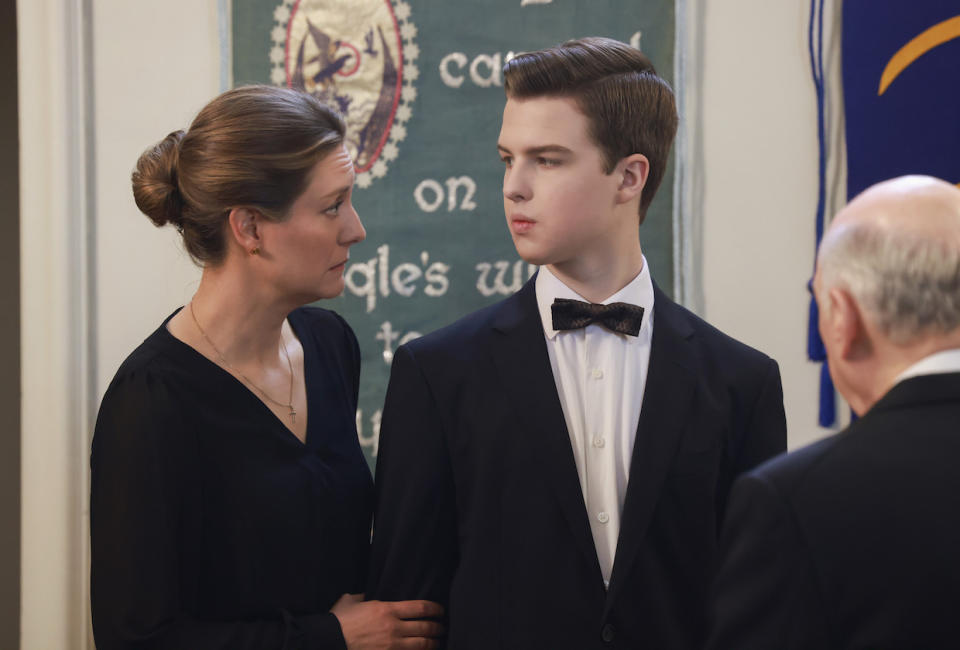
TVLINE | We see Sheldon get up and give a eulogy, then discover that what we just saw never took place. It’s what he wishes he had said that day. I couldn’t help but contrast that moment with Sheldon’s Nobel Prize acceptance. At that point in his life, at the end of Big Bang, he’s able to step up and honor his chosen family and their contributions to his life. Was part of the conceit here, with his eulogy, to create a parallel and show what Sheldon couldn’t bring himself to express at 14, and what he was able to express 25 years later, at 39?
A little bit. Obviously, the show is Young Sheldon. You want to have Sheldon have a moment at his dad’s funeral, but we also know that the character Sheldon has a lot more growth [ahead of him]. It can’t all happen here. We started to feel as we were talking about it that it felt phony for him to get up and give this speech. It’s a nice dramatic moment for our show and for our character, but it didn’t feel true to him. We had already talked about [older] Sheldon going back and rewriting those moments. It just felt like the natural way to get that moment for the end of the show and for the character, but not give him too much growth in this moment. It would sort of erase the 12 years of growth that it takes him to get to that moment at the end of The Big Bang Theory.
Best of TVLine
Get more from TVLine.com: Follow us on Twitter, Facebook, Newsletter


